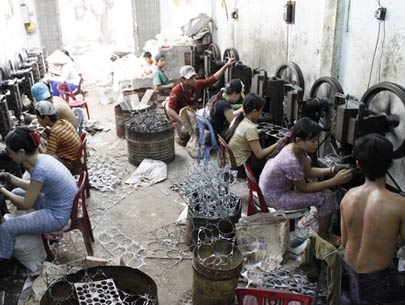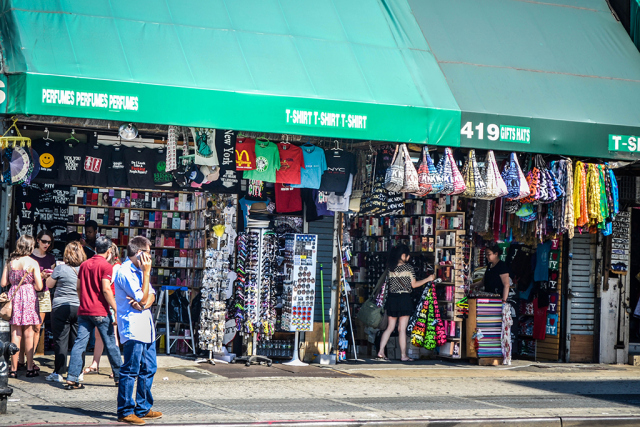He starts his first point by describing the personal experience of Dana Thomas, who witnessed the atrocities personally, "I remember walking into an assembly plant in Thailand a couple of years ago and seeing six or seven little children, all under 10 years old, sitting on the floor assembling counterfeit leather handbags. The owners had broken the children's legs and tied the lower leg to the thigh so the bones wouldn't mend. They did it because the children said they wanted to go outside and play." (Dana Thomas, Deluxe: How Luxury Lost Its Luster) This is probably his most powerful piece of evidence in his story, and it works on two fronts.
One: It gives us an image of what modern day sweatshops can look like, even how cruel they can be
Two: It plays at our heart strings, and our sense moral outrage, the fact that this can happen in our day and age is deeply disturbing.
To top it all off, "that is just the normal standard for minor exploitation in today's sweat shops." (Daniel Bukszpan) That statement helps to establish the idea of places even worse than the one described, a scary though if you ask me.
 |
| Most likely one of the better sweatshops, according to Daniel Bukszpan http://poster.4teachers.org/view/poster.php?poster_id=424543 |
Addressing his second point, Daniel refers to a place in NYC called "Counterfeit alley", were all kinds of shops, "selling anything from DVD's to jewelry" are set up in full public view. In these shops a customer can potentially "get locked in the store, forcing them to make a purchase." (Daniel Bukszpan). "According to John Feinblatt, New York City's criminal justice coordinator, this is not just a consumer protection issue, but also a public safety issue. “These buildings violate every code in the book, the exit signs are obliterated, or the fire exits are locked or blocked by boxes of merchandise. They’re firetraps. By going to these shops, potential buyers are putting their lives at risk, and possibly in the hands of the people in charge of the store, making a valid argument as to why exactly counterfeit goods can be a danger to potential buyers.
 |
| A shop located in "Counterfeit alley" http://www.purseblog.com/news/the-counterfeit-bag-market-is-being-overtaken-by-fake-contemporary-bags/ |
Even if a buyer tries to avoid buying form counterfeit peddlers, he/she is still vulnerable to buying fake goods. According to Susan Fordham, University Law professor, "The shopper who would never have considered buying from the guy on the corner whispering, 'Pssst! Want to buy a watch?' can easily be fooled by a website that looks genuine but isn't, . . .". The buyer may think they are buying the "real" product for less, but it really is almost impossible;e to tell online. This is a valid point as the increasing use of the internet for consumer trade coupled with the constant search for the lower cost of a product helps to create a environment in which people can take advantage of consumers online.
Overall, this article can really help wake up people that thought buying counterfeit was a harmless action. By showing the connection between Sweatshop labor and the industry, we are able to see that our demand on counterfeit products increases the need for these sweatshops to continue. "According to the International Chamber of Commerce, it accounts for 5 to 7 percent of all global trade." (Daniel Bukszpan). Being wary of your purchases and trying not to buy fake items may not stop this trade altogether, but at the very least, it will slow down this global monster.
Overall, this article can really help wake up people that thought buying counterfeit was a harmless action. By showing the connection between Sweatshop labor and the industry, we are able to see that our demand on counterfeit products increases the need for these sweatshops to continue. "According to the International Chamber of Commerce, it accounts for 5 to 7 percent of all global trade." (Daniel Bukszpan). Being wary of your purchases and trying not to buy fake items may not stop this trade altogether, but at the very least, it will slow down this global monster.

No comments:
Post a Comment